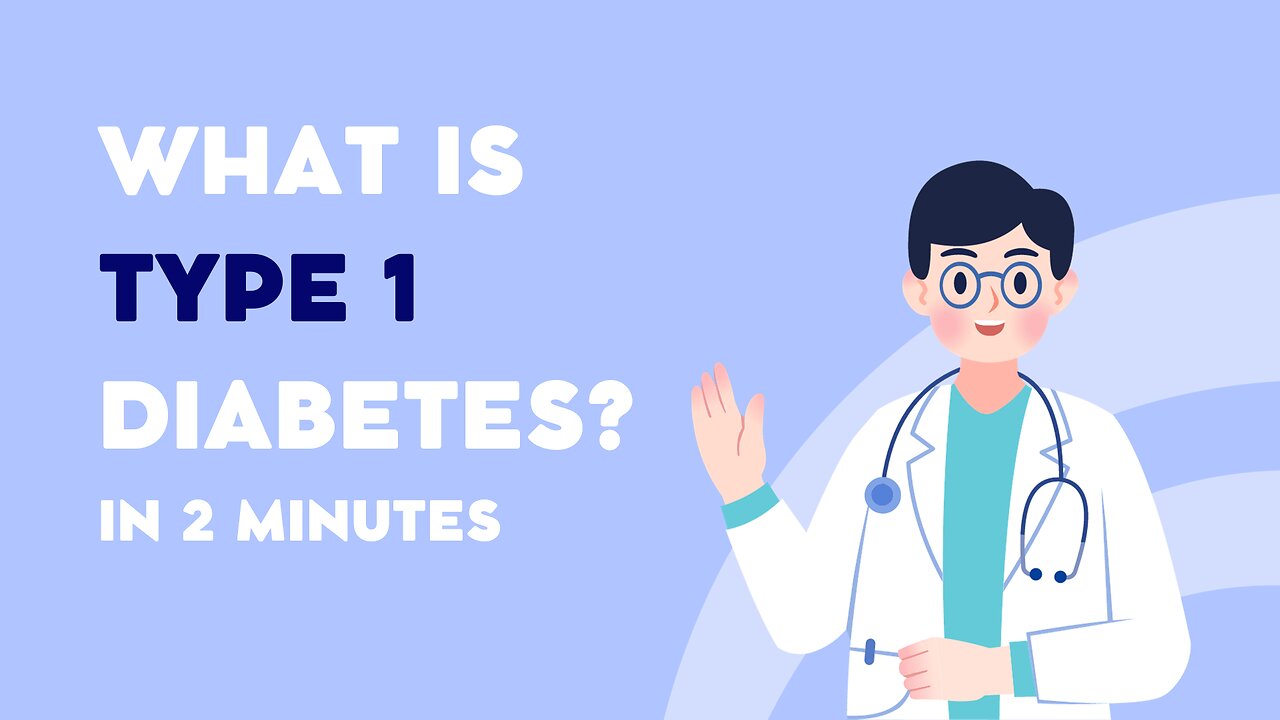Premium Only Content

What is Type 1 Diabetes in 2 Minutes
Type 1 diabetes, often referred to as "juvenile diabetes" or "insulin-dependent diabetes," is a chronic autoimmune condition in which the immune system mistakenly attacks and destroys the insulin-producing beta cells in the pancreas. As a result, the pancreas is unable to produce insulin, a hormone that regulates blood sugar (glucose) levels in the body.
Here are some key characteristics and features of Type 1 diabetes:
Autoimmune Disorder: Type 1 diabetes is an autoimmune disease, which means the body's own immune system attacks and destroys healthy cells. In this case, the immune system targets and damages the beta cells in the pancreas that produce insulin.
Insulin Dependency: People with Type 1 diabetes require lifelong insulin therapy because their bodies do not produce any insulin. Without insulin, the body cannot properly regulate blood sugar levels.
Onset in Youth: While Type 1 diabetes can develop at any age, it often starts in childhood or adolescence. However, it can also occur in adults.
Symptoms: The symptoms of Type 1 diabetes include excessive thirst (polydipsia), frequent urination (polyuria), unexplained weight loss, extreme hunger (polyphagia), fatigue, and blurred vision. These symptoms can develop relatively quickly.
Blood Sugar Management: Managing blood sugar levels in Type 1 diabetes requires a combination of insulin therapy, regular blood glucose monitoring, and careful attention to diet and exercise. The goal is to keep blood sugar levels within a target range to prevent both short-term and long-term complications.
Complications: If not properly managed, Type 1 diabetes can lead to various health complications, including heart disease, kidney disease, nerve damage (neuropathy), eye problems (retinopathy), and circulation issues. However, with good blood sugar control and proper medical care, the risk of complications can be reduced.
Treatment: Treatment for Type 1 diabetes primarily involves insulin replacement therapy. Insulin can be administered through injections or an insulin pump. The specific insulin regimen and dosage may vary from person to person based on their individual needs.
Lifestyle Management: People with Type 1 diabetes also need to pay close attention to their diet, exercise regularly, and monitor their blood sugar levels regularly. These lifestyle factors play a crucial role in managing blood sugar levels.
Type 1 diabetes is a lifelong condition that requires continuous self-management and medical care. Research into diabetes treatment and management is ongoing, with ongoing efforts to improve insulin delivery methods and find potential cures or therapies to prevent the development of Type 1 diabetes.
-
 LIVE
LIVE
RealAmericasVoice
3 days agoHOME OF REAL NEWS
10,097 watching -
 LIVE
LIVE
Benny Johnson
1 hour agoAmerican Martyr: Remembering Charlie Kirk | FBI Reveals New Footage of Assassin, Trump's Eulogy LIVE
9,228 watching -
 1:00:32
1:00:32
VINCE
2 hours agoRest In Peace Charlie Kirk | Episode 123 - 09/11/25
249K134 -
 LIVE
LIVE
LFA TV
5 hours agoLFA TV ALL DAY STREAM - THURSDAY 9/11/25
5,958 watching -
 LIVE
LIVE
Bannons War Room
6 months agoWarRoom Live
15,753 watching -
 LIVE
LIVE
The Shannon Joy Show
42 minutes agoA message of encouragement and a call for faith and unity after the tragic killing of Charlie Kirk
69 watching -
 LIVE
LIVE
The Big Mig™
1 hour agoIn Honor Of Charlie Kirk, Rest In Peace 🙏🏻
2,679 watching -
 1:36:35
1:36:35
The White House
3 hours agoPresident Trump and the First Lady Attend a September 11th Observance Event
52.9K23 -
 1:38:49
1:38:49
Dear America
3 hours agoWe Are ALL Charlie Now! This Isn’t The End. We Will FIGHT FIGHT FIGHT
140K168 -
 LIVE
LIVE
Badlands Media
10 hours agoBadlands Daily: September 11, 2025
5,018 watching